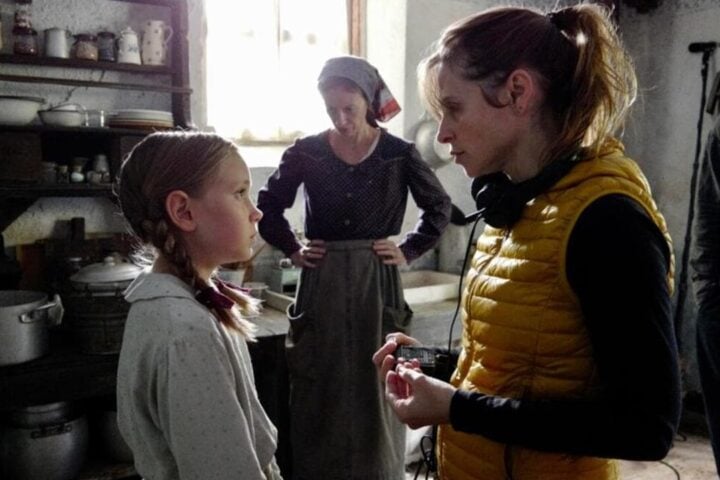Like any system that operates along gendered lines, religious-based patriarchy works well so long as those under its control are content to be confined. For many, there’s a certain comfort that comes with limits and an adherence to duty—in, say, the mother taking care of the home, the father earning the keep, and the children understanding that a certain slavish devotion to obedience keeps them in their parents’ good favor.
Vermiglio’s images are keyed to the simplicity of that kind of domesticity. Here, children tend to the cows before the milk is warmed over the stove for breakfast. Cesare Graziadei (Tommaso Ragno), the titular village’s school teacher, reads the paper devotedly for news from the Italian front as his seven children play and do their daily chores, while his wife, Adele (Roberta Rovelli), dutifully—and, it seems, happily—goes about her duties at home with tender devotion.
There are multiple ideological and formal clashes at the heart of Maura Delpero’s film, a stirring family drama set at the end of World War II. In the isolated and sparsely populated Alpine village at its center, gender roles are enforced in alternately subtle and overt ways. Vermiglio’s community is run by the strict rule of Catholic law, a religious absolutism that blocks the path to sexual discovery, female independence, and even the flow of cash. Yet the people here know no other alternative to what’s otherwise a blissful bucolic life—at least until the arrival of a mysterious and mostly silent Sicilian soldier, Pietro (Giuseppe De Domenico), brought to Vermiglio by the town’s native son, Attilio (Santiago Fondevila). Both men ran from the war, and their arrival allows a dread from the outside world to creep into Vermiglio.
It’s the initially clandestine romance between Pietro and the naïve Lucia (Martina Scrinzi), Cesare and Adele’s eldest daughter, that begins to disrupt the familial comforts of the village. Lucia seems content to look past Pietro’s stoic and mostly muted surface as they woo one another. When one of her younger sisters, Flavia (Anna Thaler), asks what they talk about when they’re in private, Lucia responds that they hold hands. And then Lucia becomes pregnant, which her mother seeks to keep under wraps until her daughter has married Pietro.
Pietro’s arrival is tantamount to a wide-ranging disruption. Ada (Rachele Potrich), after seeing Pietro and her sister in an intimate moment, struggles to reconcile her burgeoning interest in women with her religious devotion. Meanwhile, at the local watering hole, the elder men of the village discuss their role in hiding Pietro, and whether he’s a coward or not.
Because the Graziadei family is run by the rigidity of religiosity, all decisions flow from Cesare alone, an authoritative man with a booming voice whose status as the community’s lone educated man affords him unilateral power. It’s his decision and his alone which child will be sent off to further schooling and which one will enter the nunnery, even if some of those decisions are preordained by the children’s behaviors; that Dino, Cesare’s eldest son, is a failure at school and has a predilection for drinking wine has destined him to stay in Vermiglio to help the family in the fields. As the film continues, it becomes clear that Lucia is the only child who’s relatively happy with the path chosen for her, at least until devastating secrets are revealed about Pietro’s past, extinguishing the last remaining embers of the family’s peace.
Vermiglio is at once delicate and forceful, though this same quality ensures its narrative gets diffuse. Delpero tries very hard to give Cesare, Pietro, Lucia, Flavia, Ada, Adele, and Dino a proper spotlight, but the film feels as if it cannot hold all that weight, leaving one with the sense that it might have benefited from a longer running time. And yet, there’s gratification in its patchwork approach. Vermiglio’s story comes to us in waves: At first, the dangers and the joys of self-discovery play out through stolen moments and minor secrecies, while the film’s more dramatic moments crash with unexpected force, leaving with it an endless sea of heartbreak.
Since 2001, we've brought you uncompromising, candid takes on the world of film, music, television, video games, theater, and more. Independently owned and operated publications like Slant have been hit hard in recent years, but we’re committed to keeping our content free and accessible—meaning no paywalls or fees.
If you like what we do, please consider subscribing to our Patreon or making a donation.





